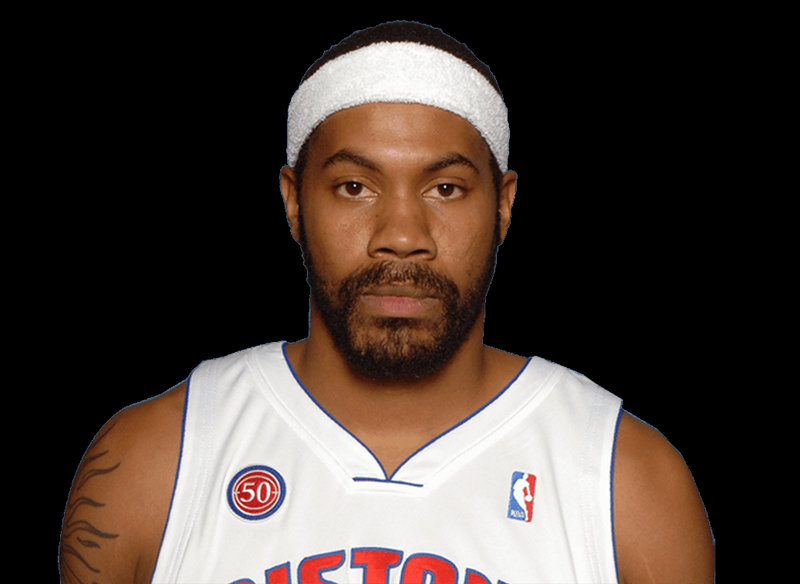Is Rasheed Wallace’s defensive leadership undervalued in Detroit’s success?
Rasheed Wallace’s defensive leadership in Detroit is too often given insufficient respect. The question is worth pondering given Wallace’s impact, which during his years with the Pistons turned the team’s defensive unit from simply average to elite. And that change in defensive play, I would argue, was a key pivot point in the ascent of the Pistons to the top of the NBA in 2004.
Rasheed Wallace’s Impact on the Pistons’ Defense
In 2004, Rasheed Wallace came to the Detroit Pistons in the middle of the season. At that stage, the Pistons were a good team, but his joining them took the Pistons’ defense to a whole new level. Wallace was so far from mediocre defensively that it was hard for other teams to score points when he was on the floor. He did have help in that regard, but from a defense-first perspective, the 2004 Pistons were the best they could be.
Think about the numbers from the 2003-2004 season: The Pistons were the fifth-best team in the league at stopping other teams from scoring, allowing what amounted to 100.8 points per 100 possessions. But once Big Ben joined the team, their defensive efficiency in the postseason skyrocketed, allowing only 92.7 points per 100 possessions.
Moreover, not only did Wallace give the team shot-blocking and stealing capabilities, but he also supplied a rare kind of vocal leadership. He was the kind of guy who could really get a team together. He could get guys together during timeouts, and he could get guys together on the floor in the middle of the game. He was the kind of guy who could direct traffic in the middle of the night on a downtown street.
Is Rasheed Wallace’s Defensive Leadership Undervalued in Detroit’s Success?
Detroit’s success in the early 2000s is attributed by many to overall team talent and coaching. However, we must evaluate how much Wallace’s influence on defense contributed to those achievements because he was not just another player. He was, in fact, a leader. His ability to defend multiple positions and switch allows Detroit to use many different looks and schemes in their defense.
The 2004 NBA Finals against the Los Angeles Lakers showcased Wallace’s versatile and potent impact, which was felt on both ends of the floor. Wallace defended superstars Kobe Bryant and Shaquille O’Neal, who scored at will against the other Piston defenders, but not against Big Ben. Statistically, Wallace held Bryant to 24.6 points per game, which is excellent work against any guard. He did much better than that against O’Neal, who was limited to 15.5 points per game.
Additionally, Wallace’s defensive intelligence was evident in the way he anticipated plays. His capacity for reading offensive sets helped the Pistons to throw a wrench into opponents’ offensive rhythms. This was particularly valuable during the playoffs when momentum was often decided by a single possession. Coaches and analysts frequently heaped praise on players like Wallace, yet his contributions often remained in the shadows of the sort of lightning bolt offensive statistics that really light up the scoreboard.
The Longevity of Defensive Leadership
Wallace’s contributions went well beyond the court during his Detroit tenure. His work ethic and commitment to defense set the tone for the franchise. Players like Tayshaun Prince and Ben Wallace flourished in the roles they played, thanks in part to the environment Wallace cultivated. This culture of defense long outlasted Wallace himself. The Pistons continued to prioritize defensive strategies in the seasons that followed.
Ben Wallace is the person to admire in this case, even if one happens to be watching him from a distance. A several-time Defensive Player of the Year, his success can be traced right back to the good, hard, no-nonsense lessons learned from Wallace. He was not exactly a hulking figure at 6-9, and yet he managed to intimidate with a kind of quiet strength.
- Tayshaun Prince: Famous for his defense, he developed a reputation as an outstanding defender under Wallace’s instruction.
Wallace not only contributed to the founding principles of playoff runs but also had a huge hand in changing the franchise’s makeup. The 2004 playoff run established the Pistons as a defensive juggernaut, which paved the way for associate head coach Mike Woodson to become, in a way, the next inventor of defensive strategies for Detroit.
Conclusion: The True Measure of Success
Rasheed Wallace’s defensive leadership is undervalued, it seems, in Detroit’s success. Yet the evidence suggests that what he provided was of crucial importance to the team’s championship run and subsequent defensive identity. At the heart of the matter is this: It is one thing to have elite defensive skills (which Wallace possesses). It is another to lead the defensive unit of a team (which Wallace also did).
In basketball, it is usually offensive players who garner the most attention and the most accolades. But defensive leaders like Wallace should also have their legacies honored because they teach the next generation of NBA players how to play the game the right way. When we think about the NBA’s next generation and the ways in which it could very well be a reincarnation of the past, Wallace is a figure whose deference to the right way of doing things could make him a valuable contributor to the game.
Explore More on us
Discover insightful blogs on our Blogging Space, check our SoloStat Score Explanation, and learn more about NBA All-Defensive Team.


